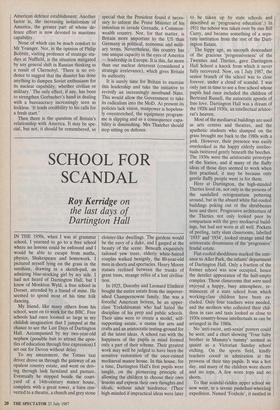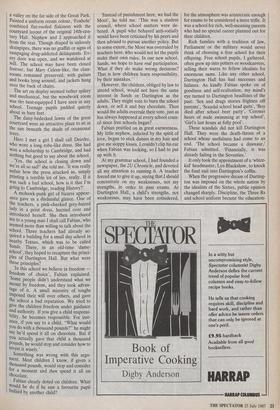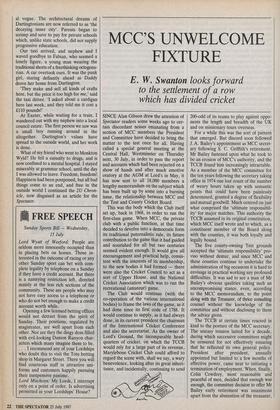SCHOOL FOR SCANDAL
Roy Kerridge on
the last days of Dartington Hall
IN THE 1950s, when I was at grammar school, I yearned to go to a free school where no lessons could be enforced and I would be able to escape from maths, physics, Shakespeare and homework. I pictured myself lying on the grass in the sunshine, drawing in a sketch-pad, an admiring blue-stocking girl by my side. I had not heard of Dartington Hall, but I knew of Monkton Wyld, a free school in Dorset, attended by a friend of mine. He seemed to spend most of his time folk dancing.
My friend, like many others from his school, went on to work for the BBC. Free schools had once loomed so large in my childish imagination that I jumped at the chance to see the Last Days of Dartington Hall. Accompanied by my two-year-old nephew (possible bait to attract the apos- tles of education through free expression) I set out for Devon without delay.
To my amazement, the Totnes taxi driver drove us through the gateway of an opulent country estate, and went on driv- ing through lush farmland and pasture. Eventually he stopped beside the court- yard of a 14th-century manor house, complete with a great tower, a barn con- verted to a theatre, a church and grey stone cloister-like dwellings. The gardens would be the envy of a duke, and I gasped at the beauty of the scene. Beneath exquisitely tailored yew trees, elderly white-haired couples walked benignly, the 80-year-old men in shorts and spectacles. Henry Moore statues reclined between the trunks of great trees, strange relics of a lost civilisa- tion.
In 1925, Dorothy and Leonard Elmhirst bought the entire estate from the impover- ished Champernowne family. She was a forceful American heiress, he an upper- class Yorkshireman who had hated the discipline of his prep and public schools. Their aims were to create a model, self- supporting estate, a centre for arts and crafts and an aristocratic testing-ground for all the latest ideas. A school run with the happiness of the pupils in mind formed only a part of their scheme. Their greatest work may well be judged to have been the sensitive restoration of the once-ruined mediaeval manor house. In this house, for a time, Dartington Hall's first pupils were taught, on the pioneering principle of allowing the children to choose their own lessons and express their own thoughts and ideals, without adult hindrance. (Their high-minded if impractical ideas were later to be taken up by state schools and described as 'progressive education'.) In 1931 the school was taken over by one Bill Curry, and became something of a sepa- rate institution from the rest of the Dart- ington Estate.
The hippy age, an uncouth descendant of the gracious 'progressiveness' of the Twenties and Thirties, gave Dartington Hall School a knock from which it never fully recovered. Now, on 1 July 1987, the senior branch of the school was to close forever, under a cloud of scandal. I was only just in time to see a free school whose pupils had once included the children of Bertrand Russell, the autocratic apostle of free love. Dartington Hall was a dream of the 1920s and 1930s, an intellectual aristoc- rat's heaven.
Most of the mediaeval buildings are used as arts centres and theatres, and the apathetic students who slumped on the grass brought me back to the 1980s with a jerk. However, their presence was easily overlooked as the happy elderly intellec- tuals twittered gently beneath the beeches. The 1930s were the aristocratic prototype of the Sixties, and if many of the fluffy ideas of those days seemed to work when first practised, it may be because only gentle fluffy people went in for them.
Here at Dartington, the high-minded Thirties lived on, not only in the persons of the sandalled octogenarians pottering around, but in the absurd white flat-roofed buildings poking out of the shrubberies here and there. Progressive architecture of the Thirties not only looked poor by comparison with the grey mediaeval build- ings, but had not worn at all well. Pockets of peeling, tatty slum classrooms, labelled `1933' and '1934', looked strange amid the aristocratic dreaminess of the 'progressive' feudal estate.
Flat-roofed shoddiness marked the entr- ance to Aller Park, the infants' department of Dartington Hall. Only a fraction of the former school was now occupied, hence the derelict appearance of the half-empty complex. Those classrooms that were used enjoyed a happy, busy atmosphere, re- miniscent of a state school from which working-class children have been ex- cluded. Only four teachers were needed, and the mothers who collected their chil- dren in cars and taxis looked as close to 1930s country-house intellectuals as can be arranged in the 1980s.
No 'anti-racist, anti-sexist' posters could be seen, and a chart showing 'Your baby brother in Mummy's tummy' seemed as quaint as a Victorian Sunday school etching. On the sports field, kindly teachers cooed in admiration at the prowess of their tiny pupils. It was a hot day, and many of the children wore shorts and no tops. A few wore tops and no shorts.
To that scandal-ridden upper school we now went, in a serene pushchair-wheeling expedition. Named 'Foxhole', it nestled in a valley on the far side of the Great Park. Painted a uniform cream colour, 'Foxhole' combined flat-roofed flakiness with the courtyard layout of the original 14th-cen- tury Hall. Nephew and I approached it from the rear. Though draped in unlovely drainpipes, there was no graffiti or signs of rampaging drug-addicted delinquents. Ev- ery door was open, and we wandered at will. The school may have been closed forever, but Mary Celeste-like, the class- rooms remained preserved, with guitars and books lying around, and jackets hung over the back of chairs.
The art on display seemed rather spikey and mechanical, but the woodwork room was th,.. best-equipped I have seen in any school. Teenage pupils padded quietly about in bare feet.
The daisy-bedecked lawns of the great courtyard were an attractive place to sit in the sun beneath the shade of occasional trees.
Here I met a girl I shall call Deirdre, who wore a long robe-like dress. She had won a scholarship to Cambridge, and had nothing but good to say about the school. `Yes, the school is closing down and we're all so sad!' she told me. 'It was really unfair how the press attacked us, simply Printing a terrible lot of lies, really. If it was such a bad school, how is it that I'm going to Cambridge, reading History?' A mohawk-punk girl of bizarre appear- ance gave us a disdainful glance. One of the teachers, a pink-cheeked grey-haired lady in a print dress, hurried over and Introduced herself. She then introduced me to a young man I shall call Fabian, who seemed more than willing to talk about the school. Three teachers had already ac- quired a building for a small day school in nearby Totnes, which was to be called Sands. There, in an old-time 'dame school', they hoped to recapture the princi- ples of Dartington Hall. But what were these principles? 'In this school we believe in freedom — ft; eedom of choice', Fabian explained. Some people didn't understand what we meant by freedom, and they took advan- tage of it. A small minority of toughs imposed their will over others, and gave the school a bad reputation. We tried to give the children freedom under guidance and authority. If you give a child responsi- bility, he becomes responsible. For inst- ance, if you say to a child, "What would you do with a thousand pounds?" he might say he'd spend it all on chocolate. But if you actually gave that child a thousand pounds, he would stop and consider how to invest it wisely.' Something was wrong with this argu- ment. Most children I know, if given a thousand pounds, would stop and consider for a moment and then spend it all on chocolate.
Fabian clearly doted on children. What would he do if he saw a favourite pupil bullied by another child? `Instead of punishment here, we had the Moot', he told me. 'This was a student council, where school matters were de- bated. A pupil who behaved anti-socially would have been criticised by his peers and then advised to pursue another policy. But to some extent, the Moot was overruled by teachers here, who would not let the pupils make their own rules. In our new school, Sands, we hope to have real participation. What if they do make wrong decisions? That is how children learn responsibility, by their mistakes.'
However, the children, obliged by law to attend school, would not have the same interest in Sands or Dartington as the adults. They might vote to burn the school down, or sell it and buy chocolate. Then would the adults overrule their vote, just as has always happened at every school coun- cil since free schools began?
Fabian prattled on in great earnestness. My little nephew, infected by the spirit of love, began to stick daisies in my hair and give me sloppy kisses. I couldn't clip his ear when Fabian was looking, so I had to put up with it.
At my grammar school, I had founded a newspaper, the 2U Chronicle, and devoted all my attention to running it. A teacher forced me to give it up, saying that I should concentrate on my weaknesses, not my strengths, in order to pass exams. At Dartington Hall, a child's strengths, not weaknesses, may have been considered, for the atmosphere was aristocratic enough for exams to be considered a mere trifle. It was a school for rich, well-meaning parents who had no special career planned out for their children.
Rich families with a tradition of law, Parliament or the military would never think of choosing a free school for their offspring. Free school pupils, I gathered, often grew up into potters or woodcarvers, selling their wares to fellow idealists for enormous sums. Like any other school, Dartington Hall has had successes and failures. As kindly Fabian spoke on of goodness and self-realisation, my mind's eye turned to Dartington headlines of the past: Sex and drugs stories frighten off parents', 'Scandal school head quits', 'Boy died after school beer party', 'Coroner hears of nude swimming at top school', `Girl's last hours at folly pool'.
These scandals did not kill Dartington Hall. They were the death-throes of a school whose usefulness had come to an end. 'The school became a dinosaur,' Fabian admitted. 'Financially, it was already failing in the Seventies.'
It only took the appointment of a 'whizz- kid' headmaster, Lyn Blackshaw, to knock the final nail into Dartington's coffin.
When the progressive dream of Darting- ton was imposed on the whole nation by the idealists of the Sixties, public opinion changed sharply. Discipline, the Three Rs and school uniform became the education- al vogue. The architectural dreams of Dartingtonians are now referred to as 'the decaying inner city'. Parents began to scrimp and save to pay for private schools which, unlike state schools, did not supply progressive education.
Our taxi arrived, and nephew and I waved goodbye to Fabian, who seemed a lonely figure, a young man wearing the traditional shorts of a freethinking octogena- rian. A car overtook ours. It was the punk girl, staring defiantly ahead as Daddy drove her home from Dartington.
`They make and sell all kinds of crafts here, but the price it too high for me,' said the taxi driver. 'I asked about a cardigan here last week, and they told me it cost a £110 pounds!'
At Exeter, while waiting for a train, I wandered out with my nephew into a local council estate. The first person we saw was a small boy running around in the altogether. Dartington's values have spread to the outside world, and her work is done.
What of my friend who went to Monkton Wyld? He fell a casualty to drugs, and is now confined to a mental hospital. I stayed miserably at grammar school, until the day I was allowed to leave. Freedom, freedom! Happiness had been postponed, but all bad things come to an end, and free in the outside world I continued the 2U Chron- icle, now disguised as an article for the Spectator.




















































 Previous page
Previous page